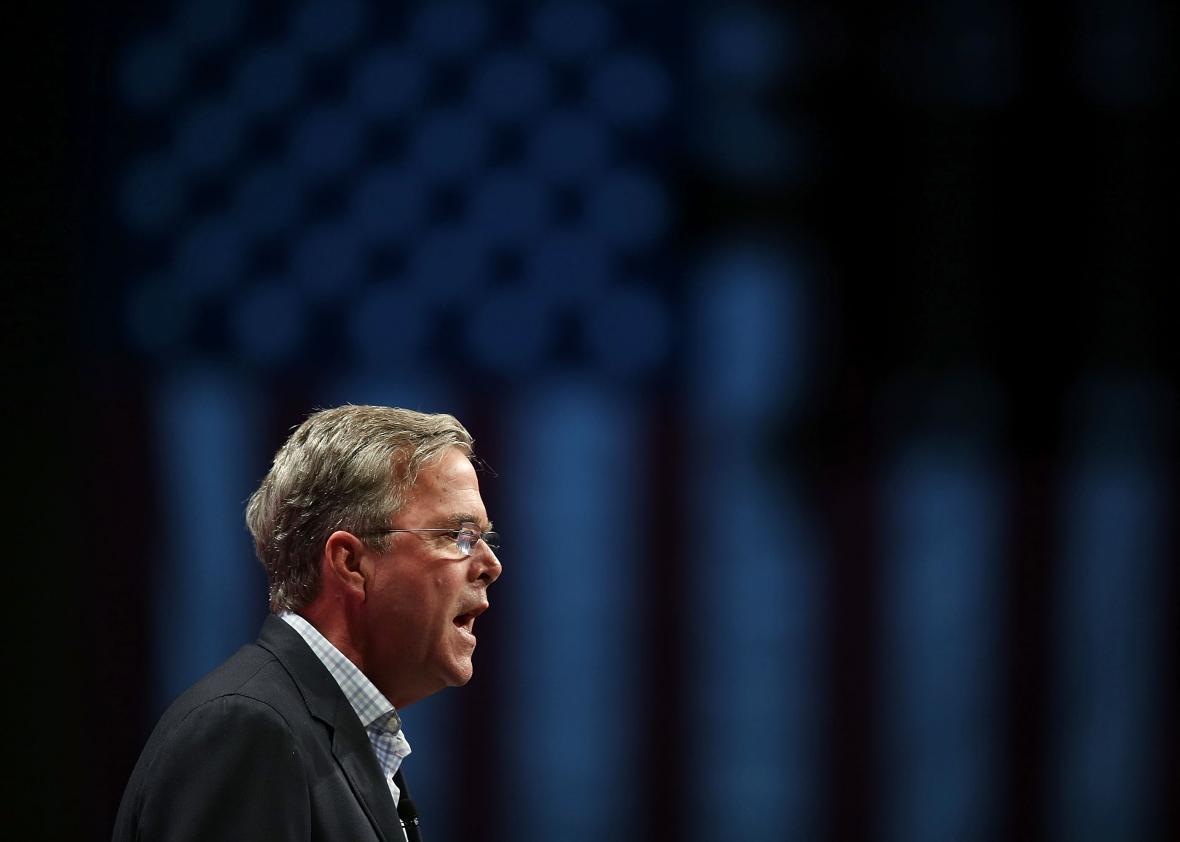Like father, like son—like other son.
During a speech at a South Carolina military college on Wednesday, Jeb Bush called for a U.S.-led coalition to use “overwhelming force” to destroy ISIS and end the “war of our time.” Bush didn’t say exactly what such an effort would look like, but he did make it clear it would involve sending more American troops to foreign soil.
“While air power is essential, it alone cannot bring the results we seek,” Bush said. “The United States—in conjunction with our NATO allies and more Arab partners—will need to increase our presence on the ground.” (During a previous foreign policy speech this summer, Jeb suggested U.S. forces could be used to help identify targets for airstrikes, but he also left the door open for a larger presence on the ground.)
Bush’s speech at the Citadel was scheduled long before Friday’s terrorist attacks in Paris, but his appearance took on added weight given it came as Washington debates whether to limit, halt, or continue President Obama’s planned resettlement of thousands of Syrian refugees who are fleeing their war-torn home country. His speech, though, was more about making the case for his candidacy than about carving out a distinct national security policy.
“This brutal savagery is a reminder of what is at stake in this election,” he said while standing in front of a half-dozen American flags and speaking to scores of the school’s cadets. “We are choosing the leader of the free world. And if these attacks remind us of anything, it is that we are living in serious times that require serious leadership.”
While Jeb didn’t mention Donald Trump by name, Bush’s camp has made little secret of the fact that they hope the Paris attacks will allow him to convince conservative voters to end their flirtations with nontraditional candidates and opt for one with closer ties to the political establishment. As I’ve written before, though, it’s unclear that will actually happen. When Reuters pollsters asked Republican voters this week to choose which of their potential nominees was best-suited to address terrorism following Friday’s attacks, Trump topped the field with 33 percent, followed by Marco Rubio at 17 percent. Jeb, meanwhile, tied for third place with Ben Carson at 9 percent. (This Ben Carson.)
Complicating things for Bush is that despite his attempts to look like a commander in chief, he doesn’t actually have the résumé of one. He has no military or direct foreign policy experience. He likes to tout his experience as a two-term governor—but judging by the early exits of Scott Walker, Rick Perry, and Bobby Jindal, government-executive experience isn’t exactly the biggest selling point with conservatives this year.
Bush, then, is implicitly trading on his last name—whether he’s willing to admit it or not. His team of foreign policy advisers is pretty much an alumni society of past Bush administrations. The group includes James Baker, who served as secretary of state under 41, and Paul Wolfowitz, who served as deputy defense secretary under 43 and who is considered a chief architect of the Iraq war. That would likely be a problem in the general election, though it might provide an opening for him in the primary. Unlike Democrats and independents, Republican voters still support the Iraq war—they do so by more than a two-to-one margin—and have fonder-than-you-might-expect memories of George W. Bush.
Jeb’s challenge in the wake of Paris, though, is the same one he’s had all along: Finding a way to reach a conservative electorate that has shown an affinity for candidates who strike unapologetically and distinctly unstatesmanlike postures. On Wednesday, Bush ramped up his rhetoric (he called the fight with ISIS a “struggle that will determine the fate of the free world”), but he sounded almost tame compared with his rivals who are pretending they want to trade actual punches with Obama over his foreign policy (Ted Cruz) or promising to “bomb the shit” out of ISIS (Trump). By trying to sound more like a president, then, Bush risks losing his chance to become one.
